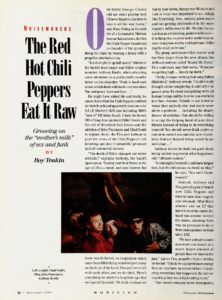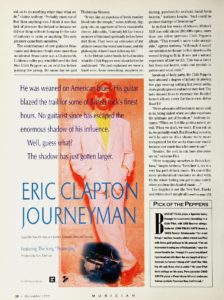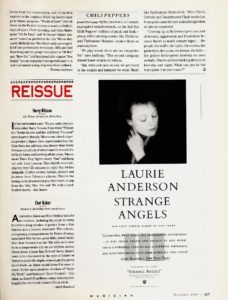Many thanks to Hamish at RHCP Sessions for the scans
NOISEMAKERS
The Red Hot Chili Peppers Eat It Raw
Grooving on the `mother’s milk” of sex and funk
BY Roy Trakin
ONE THING George Clinton told me about playing funk I’ll never forget is, you have to take it all the way home,” says Flea. Sitting in the middle of a fashionable Melrose Avenue Italian bistro, the Red Hot Chili Pepper bassist and co-founder of the group is doing his share by wearing a beany with a propeller attached on top.
“You don’t give it up half-assed,” chimes in his buddy, lead singer and fellow original member Anthony Kiedis, who’s attracting some attention via a particularly colorful tattoo on his shoulder “Funk is hard-core music which deals with hard-core emotions. War and peace. Love and hate …”
He might have added life and death, because that’s what the Chili Peppers confront on their fourth and apparently most successful LP, Mothe6 Milk (not including 1988’s “best or EP, Abbey Road). It took the heroin OD of long-time guitarist Hillel Slovak and the exit of drummer Jack Irons—and the addition of John Frusciante and Chad Smith to replace them—for Flea and Anthony to grab the reins of the Chili Peppers’ cult following and steer it toward the promised land of commercial success.
“The death of Hillel changed our entire attitude,” explains Anthony, the band’s spokesman. “Losing your best friend at the age of 26 is a mind- and soul-blower. But there was definitely an inspiration which came from Hillel dying which helped sharpen the focus of the band. Flea and I were left with each other, and we decided, ‘Here’s something we started a long time ago that we haven’t finished.’ We both realized we had to bear down, change our lifestyles and look at what was important to us—things like friendship, love, making great music and not getting sidetracked by the more negative influences in life. We tried to use our loss as a bolstering, positive influence—if nothing else, to prove to the world what we were doing was worthy and legitimate. Hillel may be dead; we’re not.”
The group underscored that resolve with the first single from the new album, the AOReady anthem called “Knock Me Down.” It’s a cautionary saga that warns, “If you see me getting high … knock me down.”
“Oddly, I began writing that song before Hillel died,” Anthony reveals. “I hadn’t really thought about completing it until after he passed away. It’s about recognizing we’re all human beings and the best we can ever be is just that—human. Nobody is any better or worse than anybody else. And you’re never above a problem … including the deadly disease of addiction. One should be willing to accept the helping hand of your close friends instead of trying to do everything yourself. You should never think you’re so cool or in control you can take care of problems that are beyond being solved by an individual …”
Anthony insists he feels not guilt about being unable to prevent what happened, only “ultimate sadness.” hindsight, I wished I could have helped him, but it’s ridiculous to dwell on that,” he says. “You can’t blame yourself.”
Instead, Anthony and Flea picked a pair of brand-new Chili Peppers and tried to turn their tragedy into triumph. After three albums and an EP that failed to dent the charts, the band was anxious to raise the stakes, insisting there was no pressure to do so from management or their label, EMI.
“We have a desire to communicate our music to a much larger amount of people than we have in the past,” agrees Flea, propellor blades turning on his hat. “I think we captured more energy than we ever have on record before. Considering everything that happened, the fact we stayed together was a big bonding factor.” “Our record company never attempted to ask us to do anything other than what we do,” claims Anthony. “Probably more out of fear than anything else. I think it was that lack of pressure that helped us because we did our thing without changing for the sake of industry or radio or anything. The only pressure came from ourselves.”
The contributions of new guitarist Frusciante and drummer Smith were more than incidental. Frusciante was a Chatsworth, California valley guy who’d followed the Red Hot Chili Peppers as an avid fan before joining the group, the same day he quit Thelonious Monster.
“It was like an injection of fresh monkey blood into the temple,” notes Anthony, digging into an appetizer of fresh mozzarella cheese. John adds, “I already felt like I was a member of this band spiritually before I ever met them. They were an extension of my attitude toward the world and music, and my philosophy of how I want to live my life.”
As for Detroit native Smith, he had no idea what the Chili Peppers were about before he auditioned. “We just explained we were a hard-core, bone-crunching, mayhem-inducing, psychedelic sexfunk band from heaven,” Anthony laughs. “And could he produce that type of drumming?
In its first few weeks of release, Mother’s Milk has sold almost 200,000 copies, more than any other previous Chili Peppers album. “This record is more radio-acceptable,” agrees Anthony. “Although it wasn’t our intention to change in that direction. We weren’t tiling to fit in. It was just a natural expression of how we felt. This was a direct link from our hearts, souls and genitals to guitars and vocal cords.”
Speaking of body parts, the Chili Peppers have attained a degree of infamy by playing live gigs wearing nothing but sweat socks, strategically placed and not on their feet. The lads donned hose to recreate the Beatles’ famed album cover for their own Abbey Road EP!
“We’re advocates of freedom in music and, to us, being naked when you play expresses the ultimate act of freedom,” Anthony declares. When we feel like getting naked, we will. When we don’t, we won’t. If you ask us to, we probably won’t. But if you beg us not to, we’ll be sure to. It’s a shame we’re more recognized for the socks than our music because our music has a lot more to say.”
Besides, the sock is out, hors d’oeuvres are in,” exclaims Flea.
“We’re wrapping ourselves in Polish kielbasa,” laughs Anthony. “Let’s face it, sex is a very big part of funk music. It’s one of the more predominant emotions we deal with. It’s the whole feeling you get in your crotch when you hear this kind of music …”
Los Angeles is not like New York. Blacks and whites don’t mingle all [cont’d on page 127]
PICK OF THE PEPPERS
BASSIST FLEA plays a Spector bass, though he’s currently breaking In a Guild Pilot, with GHS Boomer strings. Guitarist JOHN FRUSCIANTE favors a 1968 Fender Stratocaster “for most things,” and has recently added a black Les Paul with three gold pickups to his arsenal. “I’m not interested in using any effects pedals,” says the stone Hendrix fan, “though I’m sure I would be if I got involved with them for any length of time.” Instead, he favors “cheap-shit” stuff like this big old ugly Boss chorus pedal.” He uses D’Ad-dario strings on his axes. Percussionist CHAD SMITH plays a Pearl drum kit and endorses Sabian cymbals because they don’t break.”
CHILI PEPPERS
[cont’d from page 18] that much in L.A.’s largely segregated neighborhoods, so the Red Hot Chili Peppers’ collision of punk and funk—along with contemporaries like Fishbone and Thelonious Monster—makes them an anomaly here.
“We play music there are no categories for,” says Anthony. “The record company doesn’t know what to do with us.
“But, with each new record, we get closer to the sounds and intensity we want. Music like Parliament-Flinkadelic, Miles Davis, Defunkt and Grandmaster Flash excited us. From punk came the raw animal magnetism we also incorporated.
“Growing up in Holly-wood gives you a lot of tension, aggression and frustration because there’s so much sensory input … the people, the traffic, the lights, the movies, the palm trees, the ocean, the breeze, the hills—the police helicopters landing on your eyeballs. They’re all there barking down your face day and night. What can you do but regurgitate it in your music?”



